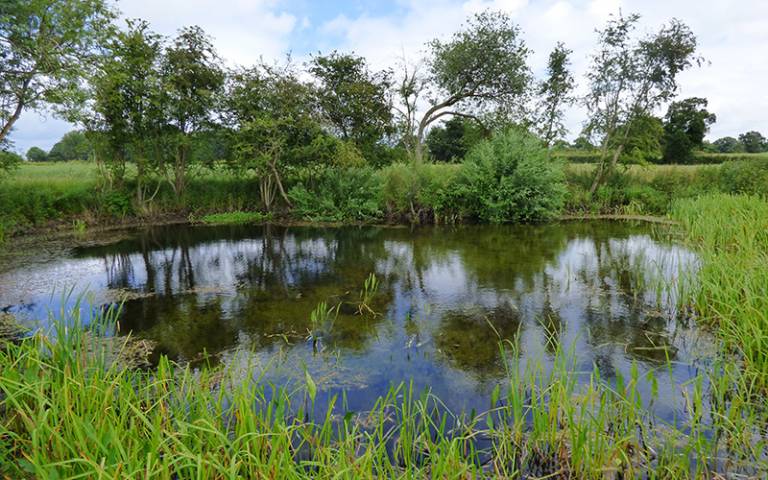Bringing farmland ponds back to life to protect Britain’s wildlife
27 August 2019
A new campaign designed to inspire farmers and the public to restore unloved farm ponds, has been launched by UCL, who aim to achieve at least 50 pond restorations this autumn.

Working with partners including, the Norfolk Ponds Project, the Upper Wensum Farm Cluster Group, Gloucestershire Farming & Wildlife Advisory and The Wildfowl & Wetlands Trust, the UCL team will be restoring ponds throughout September and October.
The Big50 initiative is set to bring farmers and local volunteers together to foster an awareness and appreciation of the value of ponds to biodiversity conservation. Restorations will take place in Norfolk, Lancashire and Gloucestershire.
Farmland ponds often have their origins as marl or clay pits and in some cases livestock watering ponds and they can be many centuries old. However, over the last 50 years farm ponds have been in-filled to create more agricultural land, while remaining ponds have been greatly neglected and become overgrown with trees making them dark and inhospitable to many species. These two forces have led to widespread declines in farmland pond biodiversity.
Researcher Helen Greaves (UCL Geography) said: “Ponds are a lifeline for Britain’s wildlife providing food and habitat throughout the year, but they are in decline. This is a national crisis.
“We are calling on farmers and the public to help to bring Britain’s ponds back to life and reverse this worrying decline.”
Norfolk has an abundance of farmland ponds with an estimated 23,000, more than any other English county.
Inspired by a Norfolk farmer, in 2014 PhD student Helen Greaves and Dr Carl Sayer from the Pond Restoration Research Group, part of UCL Geography, initiated a Norfolk Ponds Project (NPP) with the aim of restoring farmland ponds in the county.
The NPP is a partnership between several conservation organisations in Norfolk including Norfolk Farming & Wildlife Advisory Group (FWAG), Norfolk Wildlife Trust, Natural England and the National Trust.
As part of the project UCL’s Pond Restoration Research Group have researched the benefits of pond restoration for aquatic biodiversity showing huge benefits for water plants, invertebrates, amphibians and fishes. Their research also shows restored ponds to be hotspots for pollinators such as bees and hoverflies and help to feed farmland birds that dine on emerging insects.
Having already restored 60 ponds in Norfolk, the team now aims to restore 50 more farmland ponds this year across the county and further afield in Lancashire and Gloucestershire.
For a pond restoration, the team firstly make sure that there are no rare species that could be at risk. Restoration of a particularly overgrown pond usually involves major tree and scrub removal from the south and west sides of a pond to let the light in, followed by mud removal by a skilled digger driver.
After this the pond is left to its own devices and it soon starts to welcome in wildlife. Seeds from water plants, which may have been buried for hundreds of years, will germinate once they experience the warmth and light of a newly restored pond.
Dr Carl Sayer (UCL Geography) said: “It is incredible how quickly the ponds we restore come back to life. During our restorations we get dragonflies coming to visit for the first time in many decades and by the spring amphibians arrive, often including the charismatic Great Crested Newt.”
The 50 restored ponds will monitored by the UCL researchers for water quality and biodiversity. After just one year the ponds will teem with wildlife. The Norfolk Ponds Project shows how conservation and farming can work together.
Links
- UCL Ponds Restoration Research Group
- Helen Greaves’ research profile
- Dr Carl Sayer’s research profile
- UCL Geography
- Norfolk Ponds Project ‘The Big 50’
- Norfolk Ponds Project
Image
- Restored pond in Heydon, Norfolk.
Media contact
Natasha Downes
tel: +44 20 3108 3844
E: n.downes [at] ucl.ac.uk
 Close
Close

